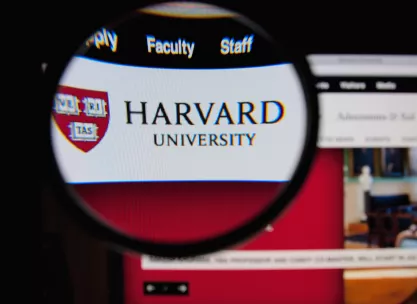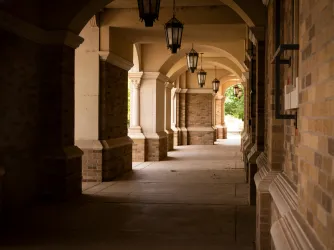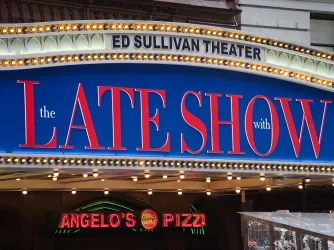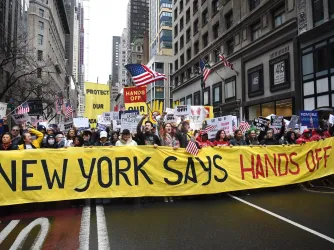Table of Contents
10 Worst Censors: 2024

It’s that time of year again — time for the first spring showers, a forecasting groundhog, flowers and chocolates, king cake, and an annual skewering of America’s worst censors. Each year, FIRE names and shames the worst-of-the-worst silencers, bowdlerizers, and steamrollers of free speech.
This year, we’ve included five free speech villains whose chilling misdeeds happened off of college campuses. The list below includes people guilty of many forms of censorship including raiding a small-town newspaper, punishing a middle schooler for wearing eye black at a football game, canceling students and professors for their views on the Israel-Hamas war, and retroactively censoring famous authors without their consent. The 13th annual Lifetime Censorship Award went to Harvard University, a university as censorial as it is famous.
Read on for full descriptions, in no particular order, of these censors’ attempts to turn America into the land of the silenced and home of the afraid.
Muirlands Middle School
San Diego middle school gives itself a black eye by punishing a student for wearing eye black.

Any sports fan knows it’s common for athletes to wear eye black — black paint or grease applied under the eyes. For some players, it’s functional, reducing glare from the sun or stadium lights. For others, like superstars Bryce Harper and Jalen Hurts — who liberally smear it on like warpaint — it’s about the look.
Last October, a Muirlands Middle School student, whose initials are J.A., adopted that look to show school spirit at a football game. He wore eye black throughout the game without incident. But a week later, J.A.’s principal suspended him for two days and banned him from future athletic events for wearing “blackface.”
Wait, what?
There was no blackface. J.A.’s eye black had no racial connotations — he was just emulating the way many athletes generously apply it under their eyes.
What’s next? The school suspending a student for wearing a charcoal face mask in an Instagram selfie?
J.A. appealed his suspension, and FIRE sent a letter in support. The bottom line is that J.A.’s face paint is constitutionally protected expression. There is no evidence it substantially disrupted school activities.
But after reviewing the play, the school district let the ruling on the field stand.
Now, with the help of Dhillon Law Group, J.A.’s family is suing. But there was a simple way for the school to avoid this challenge flag in the first place: Don’t violate the First Amendment by misrepresenting students’ expression and then punishing them for it.
Marion County Police Dept.
Feeling threatened by a small-town newspaper and its 98-year-old co-owner, police raid the paper’s headquarters, attacking the First Amendment in the process.

A police raid against a local newspaper sounds like a story out of Putin’s Russia — but it happened in the heart of Kansas.
The Marion, Kansas police, with the help of a magistrate judge (and maybe even state-level officials), cobbled together a search warrant to invade the offices of the family-owned Marion County Record. Why? They didn’t like that the newspaper had dirt on a political ally — not to mention the paper’s investigations into allegations of misconduct by the police chief himself.
They seized computers. They ripped a reporter’s cell phone out of her hand. They even rummaged around the home of the 98-year-old co-owner of the paper, ignoring her protests. The next day, following the shock of the raid, she passed away.
That’s a tragedy. The raid was an assault on press freedom that would make our Founders’ blood boil. And it should make your blood boil too. No matter your views on the state of today’s press, when public officials attack just one newspaper’s freedom, they show their contempt for everyone’s freedom.
Rightly, the Marion County police chief resigned after leading this shameful attack on the First Amendment. FIRE will continue to stand up to government bullies who try to turn journalism into a crime.
Mayo Clinic College of Medical Science
Mayo Clinic College of Medical Science tells doctor to shut up or toe the party line.

Can doctors offer a second opinion? Not according to Mayo Clinic College of Medical Science, which punished medical professor Michael Joyner for sharing his expertise and research.
Joyner is a renowned academic whose commentary on COVID-19, public health, and sex differences in sports performance you can read in CNN, The New York Times, and numerous other media outlets over his 36 years at the Mayo Clinic. For speaking in his personal capacity about these issues, Mayo Clinic suspended him for “failing to communicate in accordance with prescribed messaging” and “reflecting poorly on Mayo Clinic’s brand and reputation.”
The college also demanded he “discuss approved topics only and stick to prescribed messaging” and “vet each individual media request through Public Affairs.” In other words, Joyner can speak the words administrators put into his mouth — or not speak at all.
Yet the college promises its faculty robust academic freedom and freedom of expression — rights essential to medical professionals expected to share their expertise even when it is difficult or unpopular. Despite this commitment, Mayo Clinic leadership put its business interests above the freedom necessary for scientific innovation and sound medical advice, to the detriment of doctors and patients alike.
For sacrificing scientific integrity in a vain attempt to maintain its brand, Mayo Clinic rightfully earned condemnation from the medical community. For gagging a prominent academic merely because administrators didn’t like what he had to say, the college earned a lawsuit by Joyner and a spot on this list.
Book censors
Legislators and publishers bravely protect American people from dangerous children’s authors Mark Twain, Roald Dahl, and R.L. Stine.

If there’s one thing the left and right can agree on, it’s that some books are beyond the pale.
Legislators across the country drafted a number of vague, overbroad policies to remove or limit access to books they believe are inappropriate. And while there are important considerations regarding what constitutes a “book ban” and how curation works in public versus private libraries, many of the legislative actions crossed the line into First Amendment violations.
Texas’ READER Act, for example, required book vendors to rate books they sell to school libraries based on vague criteria surrounding what constitutes “sexually explicit” material, effectively turning booksellers into censors. Thankfully, the U.S. Court of Appeals blocked enforcement of the legislation, noting that the law was an example of unconstitutional compelled speech.
Meanwhile, other would-be censors took a different approach. In addition to the usual protests over books like “To Kill a Mockingbird” and “The Adventures of Huckleberry Finn,” we also saw a number of publishers memory-hole so-called “problematic content” from the works of authors like Roald Dahl and R.L. Stine in new editions through “sensitivity reading.” FIRE spoke out in these incidents — and in the case of Roald Dahl, contributed to public pressure that made some publishers reconsider completely phasing out the author’s original language.
Whatever the censors’ methods, the motives behind these actions are the same: to remove, revise, or restrict books they deem inappropriate for others to read. Both from a constitutional and a cultural standpoint, FIRE stands against such censorial behavior — and when it violates the First Amendment, we respond.
San Francisco State University
While San Francisco State investigates history professor for teaching history, its students make speaker flee for her safety for talking about womanhood.

San Francisco State University administrators were busy investigating a history professor for displaying a historical image in a history lesson when all hell broke loose during a speaking event on campus, ending in protesters shouting, chasing down, and cornering an Olympic athlete.
Last spring, SFSU’s censors dove headfirst into a months-long investigation of professor Mazair Behrooz after he displayed an image of the Prophet Muhammad in a class lesson about the history of the Islamic world between 500 and 1700. FIRE wrote to SFSU warning that its chilling investigation ran afoul of the school’s constitutional obligations.
While administrators were tied up violating Behrooz’s academic freedom rights, students took censorship into their own hands when former Olympic swimmer Riley Gaines came to campus to share her opinions about women’s sports and gender identities. Students and protesters screamed, chanted, stomped, and interrupted her speech, then accosted her as police officers attempted to escort her out. The officers were unable to do so safely until hours later.
FIRE wrote to SFSU urging it to investigate the response of the administration and police, and SFSU responded by confirming it was investigating the disruption and claiming it was committed to free speech.
The school was not so quick to backtrack with Behrooz, and it continued its investigation through the end of the summer.
For dragging out its chilling investigation and censorship of a history professor for teaching history and allowing its students to run roughshod over each others’ free speech rights, SFSU handily won a place on this list.
Hypocritical university admins
In the wake of the Israel-Hamas conflict, hypocritical college admins enjoy a censorship frenzy.

Universities across the country have almost as many administrators on staff as there are students on campus. What do they all do? Well, they definitely don’t protect free speech.
In the wake of Hamas’ Oct. 7 attack on Israel, as campuses roiled with protests, demonstrations, and controversies over speech, administrators enthusiastically engaged in censorship.
The University of Southern California prohibited professor John Strauss from teaching on campus after he called pro-Palestinian protestors “ignorant” and Hamas “murderers.” FIRE wrote to USC calling for the university to rescind its punishment of Strauss for his speech — which is protected under USC’s policies.
Brandeis University “unrecognized” its chapter of Students for Justice in Palestine due to pro-Hamas comments made by the national SJP organization. FIRE sent a letter reminding Brandeis that “denying student group recognition based on viewpoint, speech, or fear of disruption violates free speech principles.” FIRE sent another letter on November 17 escalating our concerns and calling on Brandeis to restore SJP’s recognition.
This turmoil was exacerbated by the hypocritical testimony of Liz Magill, Claudine Gay, and Sally Kornbluth — presidents of the University of Pennsylvania, Harvard University, and the Massachusetts Institute of Technology, respectively — before Congress. Magill and Gay in particular made remarks that were correct but deeply unsatisfying given their respective universities’ terrible track records on campus speech — which put them in the bottom two spots in FIRE’s 2024 College Free Speech Rankings.
As FIRE’s Nico Perrino wrote in response to the controversy, administrators should “defend free speech in all cases. No hypocrisy. No double standards.”
California Community Colleges
California Community Colleges stamp out racism by … labeling everyone racist.

No one can rightly force another person to pledge allegiance to the flag, but in California, community college professors are required to profess allegiance to state-mandated views on “diversity, equity, and inclusion.”
In April, California Community Colleges imposed draconian regulations forcing more than 54,000 professors to teach and promote politicized conceptions of DEI. The mandated view includes the “anti-racist” opinion that “persons that say they are ‘not a racist’ are in denial” or that “color-blindness” — that is, “treating individuals as equally as possible, without regard to race, culture, or ethnicity” — only “perpetuates existing racial inequities and denies systematic racism.”
Professors, who once assigned readings presenting different perspectives on racial issues to invite classroom discussion and debate are now altering their curriculum to avoid perspectives contrary to the state-mandated viewpoint. Other professors are left wondering how to incorporate DEI concepts into their chemistry curriculum to comply with the new rules.
Whether professors satisfy the state’s ideological requirements has real career consequences. Faculty performance and tenure are now evaluated based on professors’ demonstrated commitment to and promotion of the state of California’s “official” views.
FIRE warned California that the regulations are unconstitutional, but the state chancellor dismissed our concerns, asserting that professors lack any individual right to academic freedom to express views contrary to those mandated by the community college system.
In August, FIRE filed a lawsuit on behalf of six California community college professors to halt the new regulations. That lawsuit is pending in federal district court.
The Texas A&M University system
TAMU admins endorse censorship by text message and ban drag.

The Texas A&M System had a chilly 2023.
When board members found out that the university was hiring Kathleen McElroy — a former New York Times editor — to lead its journalism program, the text messages started flying. One board member complained that the Times was “biased and progressive leaning,” another said the “purpose of us starting a journalism program” is to get journalists “with conservative values into the market.” That goal bled over into a broader plan to “control the liberal nature” of faculty in the arts and sciences. The brouhaha ultimately saw the university’s president resign — and cost the university a cool million to settle the dispute.
A similar situation emerged when professor Joy Alonzo, an expert on the opioid crisis, criticized Lt. Gov. Dan Patrick during a lecture. An offended student in the class was the daughter of a state official. Within two hours, Chancellor John Sharp was texting with Patrick and his chief of staff, assuring them that Alonzo was “placed on administrative leave pending investigation re firing her. shud [sic] be finished by end of week.” That promise didn’t ultimately pan out, but Alonzo was suspended for two weeks.
While Sharp’s fingerprints were all over the Alonzo affair, he wouldn’t lift a finger to stop censorship. After an LGBTQ+ student organization planned an on-campus charity drag show, West Texas A&M University President Walter Wendler banned drag shows. Wendler argued that drag performances are sexist, and said he would not permit them “even when the law of the land appears to require it.” After the students sued, Wendler changed his tune, claiming that drag shows aren’t performances at all, so they aren’t protected by the First Amendment. Still, he stood by the ban, and FIRE will keep fighting against it.
New York state officials
Taylor Swift wouldn’t “change anything, anything, anything” about New York. We disagree.

New York has a problematic pattern of censorship.
After a school shooting in 2018, the Empire State launched a crusade against the National Rifle Association by threatening companies that did business with the NRA. FIRE urged the Supreme Court to hold New York accountable for its unconstitutional pressure campaign.
Shortly after another shooting in Buffalo in 2022, the state enacted a law requiring social media networks to address “hateful” speech — i.e. fully protected speech that the state doesn’t like. FIRE sued, and the lawsuit persuaded a federal judge to prohibit the state from enforcing its law because it “could have a profound chilling effect.”
But in the face of yet another tragedy — the recent attacks in Israel — New York ignored the court’s order, sending investigation letters to FIRE’s client Rumble and other social media networks demanding that they disclose their policies for removing speech related to the conflict. FIRE filed a motion urging the judge to enforce his preliminary injunction order.
Making matters worse, New York Gov. Katy Hochul got in on the action. She sent an ill-advised letter to the presidents of all colleges and universities in New York, both public and private, demanding that they discipline students for “calling for the genocide of any group of people” and promised “aggressive enforcement action” against any institution failing to do so. This would stifle political debate and blatantly violate the First Amendment.
New York must stop using tragedies as opportunities for censorship.
Florida state officials
Florida isn’t where “woke” goes to die — it’s where the First Amendment goes to retire.

In Florida, officials have performative censorship down to an art — whether on campus or on stage.
Take drag. As anti-drag bills became this year’s legislative fad, Florida joined the ranks of governments cracking down on drag performances. State officials dispatched undercover officers to monitor performances of “A Drag Queen Christmas.” Those undercover agents reported — in records obtained by FIRE — that there were “provocative” outfits, but “no lewd acts.” That didn’t stop Florida’s officials from going after the theater’s liquor license anyway. Not content to be left out, Florida’s legislature then passed a law of its own targeting drag performances — a law soon put on ice by a federal court.
The same chilling charade plays out on campus. In the wake of the Oct. 7 Hamas attacks in Israel, the chancellor of Florida’s universities demanded university officials ban Students for Justice in Palestine chapters, threatening “adverse employment actions and suspensions for school officials.” But when the university leaders, citing the possibility of personal liability for violating students’ First Amendment rights, balked and the student groups sued, that will to censor evaporated. Soon, Florida meekly told a federal judge that the formal memo was little more than a suggestion — an “open letter” — and it had no real plans to follow through.
Not only did Florida’s university presidents have issues with censorship in 2023, but Florida’s 28 college presidents started the year by unanimously pledging to enforce Florida’s “Stop WOKE Act” — even after a federal court said the “positively dystopian” law violated the First Amendment in higher education. FIRE is challenging the Stop WOKE Act in court.
Lifetime Censorship Award: Harvard University
Harvard is America’s worst college for free speech. Its recent attempt to silence The New York Post shows why.

Harvard University came in dead last on this year’s College Free Speech Rankings — achieving a worst-ever score. When asked about Harvard’s abysmal ranking during her congressional testimony in December, then-Harvard President Claudine Gay said she didn’t think the ranking was “an accurate representation” of Harvard’s respect for free speech. But all one needs to do to understand Harvard’s disrespect for free speech is look at its record of censorship.
Only a few weeks before Gay’s testimony, Harvard hired self-advertised “media assassins” to threaten the New York Post with a defamation lawsuit and “immense” damages if the paper published a story alleging Gay plagiarized some of her scholarship. So much for placing “a high priority on freedom of speech” — or freedom of the press for that matter. Gay resigned on Jan. 2, after more than 40 allegations of plagiarism came to light.
Long before Harvard threatened news outlets with litigation for their reporting, it punished faculty and students for their speech. School administrators drove out lecturer Carole Hooven for arguing that biological sex is real. It rescinded a fellowship for former Human Rights Watch Executive Director Kenneth Roth over his purported “anti-Israel bias.” It effectively fired an economics professor for an op-ed he published in India. It canceled a professor’s course on policing following student uproar. It fired professor Ronald Sullivan from his deanship after students protested his role on Harvey Weinstein’s criminal defense team. It bizarrely demanded students take down a Nicki Minaj flag because the community could find it “offensive.” And the list goes on.
Even outside speakers invited to campus aren’t safe from Harvard’s censorial glare. In 2022, feminist philosopher Devin Buckley was disinvited from an English department colloquium because of her views on sex and gender. Her talk was supposed to be on the separate topic of British romanticism.
Harvard students clearly feel the chill. Students report low administrative support for free speech and low comfort expressing ideas, placing the school near the bottom of FIRE’s College Free Speech Rankings in both individual categories. Unfortunately, Harvard students themselves may also contribute to the problem. If the efforts to oust Sullivan and cancel the policing class aren’t evidence enough, an alarming 30% of Harvard students think using violence to stop a campus speech is acceptable in at least some circumstances.
For its long track record of censorship, Harvard is receiving FIRE’s Lifetime Censorship Award. It joins Georgetown University, Yale University, Syracuse University, Rensselaer Polytechnic Institute, and DePaul University in receiving this “honor.” It’s past time Harvard truly commits to its ostensible truth-seeking mission and the principles of free speech and academic freedom that make it possible. But that may be wishful thinking, the triumph of hope over experience.
Recent Articles
Get the latest free speech news and analysis from FIRE.

He refused to censor his syllabus — so Texas Tech cancelled his class

Fandom’s lighthouse in a sea of censorship

FIRE statement on Stephen Colbert’s James Talarico interview and continued FCC pressure


